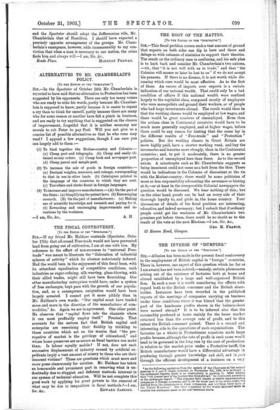THE FISCAL CONTROVERSY.
[To THE EDITOR OF THE "SPECTATOR."'
Snt,—If my friend Mr. Haldane contends (Spectator, Octo- ber 17th) that all-round Free-trade would not have prevented land from going out of cultivation, I am at one with him. My reference to the effect of non-recourse to "universal Free- trade" was meant to illustrate the "dislocation of industrial spheres of activity " which its absence notoriously induced. Had the world been in the enjoyment of this fiscal boon, with its attendant equalisation of competitive conditions, such industries as sugar-refining, silk-weaving, glass-blowing, with their allied trades, might still have been flourishing. Our other manufacturing enterprises would have, under a system of free exchanges, kept pace with the growth of our popula- tion, and, as a consequence, emigration would have been largely arrested. I cannot put it more pithily than in Mr. Haldane's own words : " Our capital must have tended more and more in the direction of the manufacture of com- modities," &c. Again we are in agreement. One other point. He observes that " capital flows into the channels where it can most profitably employ itself." Precisely. That accounts for the serious fact that British capital and enterprise are exercising their fluidity by trickling to those countries which act on the maxim that "the pre- rogative of market is the privilege of citizenhood," and whose home preserves are as secure as fiscal barriers can make them. Is labour equally mobile ? If not, does not each successive displacement of industry caused by artificial ex- pedients imply a vast amount of misery to those who are their innocent victims ? These are questions which must more and more press clamorously for solution. Mr. Haldane has taken an honourable and prominent part in removing what is un- doubtedly due to sluggish and deficient methods inherent in our system of technical education. Will he not complete this good work by applying his great powers to the . removal of what may be due to inequalities in fiscal methods P—I am,


















































 Previous page
Previous page